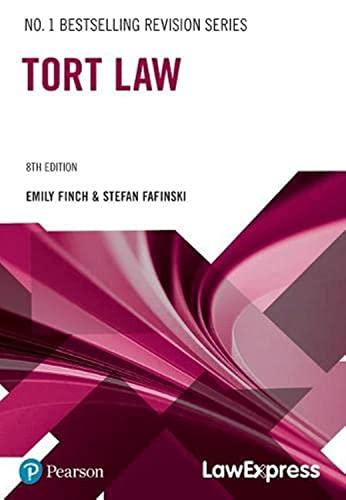Question
Question 1 It is important for law students to understand the Court Structure in their home countries. The knowledge of your country's court structure will
Question 1
It is important for law students to understand the Court Structure in their home countries. The knowledge of your country's court structure will be useful when we learn about the Doctrine of Precedent later on in the semester.
Using the prescribed text, relevant legislation and other materials (official government websites, PacLII database):
Outline the court structure (hierarchy) of your home country (or USP country of your choice) beginning with the highest court and ending with the lowest court; and
After outlining the court structure of your home/chosen country, identify which courts are the 'intermediary appellate court' and the 'higher/highest appellate court'
Note for Samoan Students: Please note that the court structure provided in the prescribed text does not reflect the Constitutional amendments which were passed in December 2020. It is recommended that you refer to the relevant legislation/external materials.
Question 2
In Week 1, students learned about the judicial decision making process. One of the principles that we learned is that in order for a decision to be valid, the court must be authorised by law (or have the jurisdiction) to hear the matter. A matter that is heard outside of the mandated jurisdiction is invalid and unlawful.
In this exercise, you will conduct research on the jurisdictions of the different courts outlined in your answer in Question 1. The question you will need to answer is: What matters are the Courts authorised to hear? For the purposes of this research task, students should focus only on the civil and criminal jurisdictions of each Court. Please outline your answers on a table (as below) citing the correct legal authority for your answers. I have done the High Court of Niue (the lowest court) as an example.
Jurisdiction of the Courts in Niue
Court
Civil
Criminal
???
???
???
High Court
Unlimited first instance jurisdiction - Niue Constitution art 37(2).
A Commissioner or two Justices of the Peace have jurisdiction to deal with actions relating to the recovery of debt/damages or recovery of chattels not exceeding $1500 - Niue Constitution art 51.[1]
Unlimited first instance jurisdiction - Niue Constitution art 37(2).
Note: Students do not need to do this exercise for specialized courts (ie. Courts that deal only with land and chiefly title matters) - however, as a matter of practice and for your own personal learning, it would be good to make note of it!
Step by Step Solution
There are 3 Steps involved in it
Step: 1

Get Instant Access to Expert-Tailored Solutions
See step-by-step solutions with expert insights and AI powered tools for academic success
Step: 2

Step: 3

Ace Your Homework with AI
Get the answers you need in no time with our AI-driven, step-by-step assistance
Get Started


